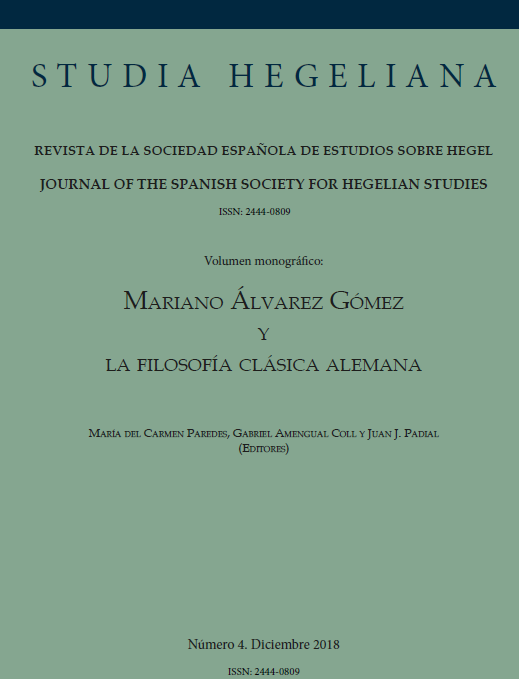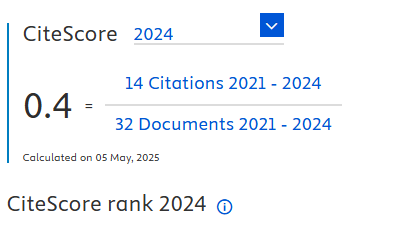Spinoza and Hegel: on the Sense of Reality
DOI:
https://doi.org/10.24310/stheg.4.2018.11384Keywords:
ABSOLUTE, NECESSITY, REASON, SENSE, HUMAN NATUREAbstract
Spinoza and Hegel seem to be two of the most rationalistic in the history of philosophy, but it is not so much in the Dutch one. It is very important to reflect about some keys of his thought: a) there is not any isomorphism between being and thinking (or nature and reason); b) the indetermination of God-Nature is deliberated and it is impossible to attribute any kind of sense and meaning to the absolute; c) the foundations of reason are the «common notions», that belong to a physic model of thinking.
Downloads
Metrics
Publication Facts
Reviewer profiles N/A
Author statements
Indexed in
-
—
- Academic society
- N/A
- Publisher
- Universidad de Málaga
References
Álvarez M. (1978): Experiencia y sistema. Introducción al pensamiento de Hegel,
Salamanca: Universidad Pontificia.
-«Idea y acción. La historia como teodicea en Hegel», Cuadernos Salamantinos de
Filosofía, XI, 1984, 205-230.
Cassirer, E. (1951): Individuo y cosmos en la filosofía del Renacimiento, Buenos Aires:
Emecé Editores.
Deleuze, G. (1975): Spinoza y el problema de la expresión, Barcelona: Muchnik.
Espinosa Rubio, L. (1995): Spinoza: naturaleza y ecosistema, UPSA, Salamanca.
-«La relación de voluntad y entendimiento en la modernidad temprana: una clave
antropológica para la teoría y la praxis», Isegoría 53 (2015-2) 337-370.
Fernández, E. (1981): «Hegel ante Spinoza: un reto», Anales del Seminario de
Metafísica XVI, 31-88.
Ferrater Mora, J. (1979): De la materia a la razón, Madrid: Alianza.
Hegel, G. W. F. (1997): Enciclopedia de las ciencias filosóficas (ed. R. Valls), Madrid:
Alianza Editorial.
-(1983): Fenomenología del espíritu (ed. W. Roces), Madrid, FCE (5ª reimp.)
Koyré, A. (1979): Estudios galileanos, Barcelona, Siglo XXI.
Macherey, P. (1979): Hegel ou Spinoza, Paris, Maspero.
Pacho, J. (1997): Los nombres de la razón, Bilbao, Universidad del País Vasco.
Rosset, C. (1976): Lógica de lo peor. Elementos para una filosofía trágica, Barcelona:
Barral.
Spinoza, B. (1972): Opera (ed. C. Gebhardt), Heidelberg, Carl Winter, 4 vol.
Wetlesen, J. (1979): The Sage and the Way. Spinozaes Ethics of Freedom, Assen: Van
Gorcum,1979.
Downloads
Published
How to Cite
Issue
Section
License

This work is licensed under a Creative Commons Attribution-NonCommercial-ShareAlike 4.0 International License.
This journal provides immediate free access to its content under the principle of making research freely available to the public. All contents published in Studia Hegeliana. Journal of the Spanish Society for Hegelian Studies, are subject to the Creative Commons Attribution-NonCommercial-ShareAlike 4.0 licence (specifically, CC-by-nc-sa), the full text of which can be found at <http://creativecommons.org/licenses/by-nc-sa/4.0>. Derivative works are therefore permitted as long as they are not used for commercial purposes. The original work may not be used for commercial purposes. The journal is not responsible for the opinions expressed by the authors of the works published in it.
It is the authors' responsibility to obtain the necessary permissions for images that are subject to copyright.
Authors whose contributions are accepted for publication in this journal retain the copyright. It is non-exclusive right to use their contributions for scholarly, research and educational purposes, including self-archiving or deposit in open access repositories of any kind.
Since volume 7 of 2021 the journal Studia Hegeliana has changed the copyright. Since that year the authors have retained the copyright.
The electronic edition of this journal is published by the Editorial de la Universidad de Málaga (UmaEditorial), being necessary to cite the source in any partial or total reproduction.







244.png)




















